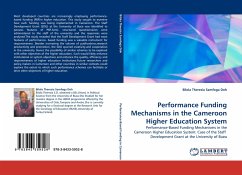
An Economic Analysis of the University. University Governance and the Effects of Faculty Participation in University Decision-Making
Versandkostenfrei!
Versandfertig in 6-10 Tagen
29,90 €
inkl. MwSt.

PAYBACK Punkte
0 °P sammeln!
During the last few years, the German higher education landscape has witnessed an increase in the delegation of decision power from the state to the universities. In order to adapt to this new situation, universities are more and more looking at management structures, decision-making systems, and governance mechanisms as fundamental performance drivers. The objective of this dissertation is to provide an economic insight into the inner workings of universities in Germany, thus answering the question of how they should organize themselves in order to persist in times of economic, organizational...
During the last few years, the German higher education landscape has witnessed an increase in the delegation of decision power from the state to the universities. In order to adapt to this new situation, universities are more and more looking at management structures, decision-making systems, and governance mechanisms as fundamental performance drivers. The objective of this dissertation is to provide an economic insight into the inner workings of universities in Germany, thus answering the question of how they should organize themselves in order to persist in times of economic, organizational, and competitive challenges. Special focus lies on the analysis of the role of faculty in participative university decision-making and its positive and negative effects on the university. Based on theoretical and empirical analysis, the dissertation outlines policy recommendations that may help to overcome the problems inherent in todays university management and governance structures in Germany.














